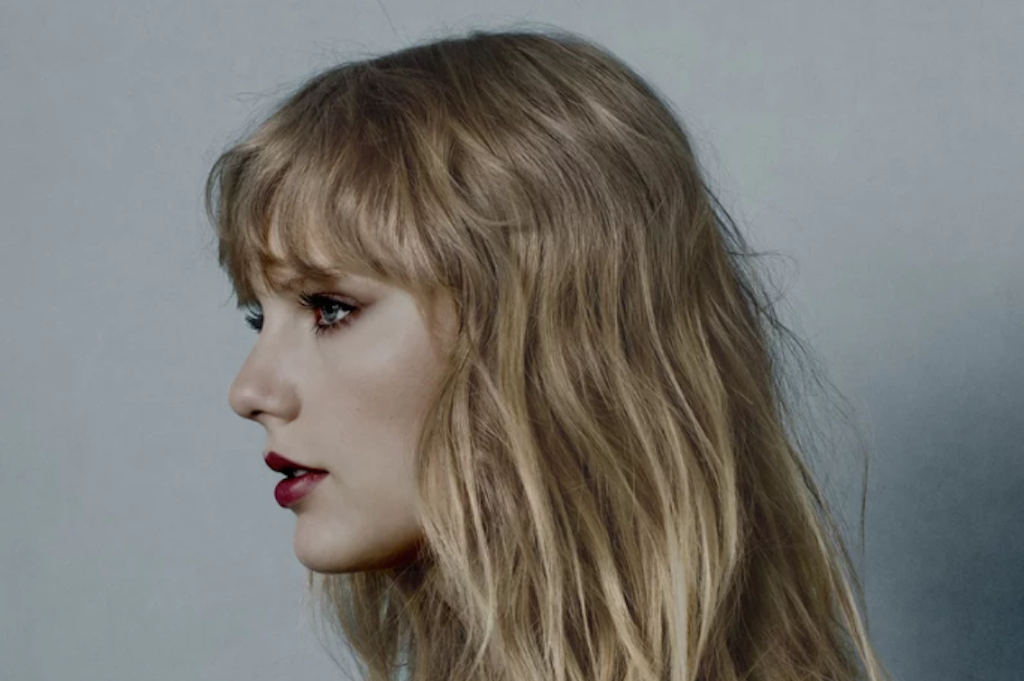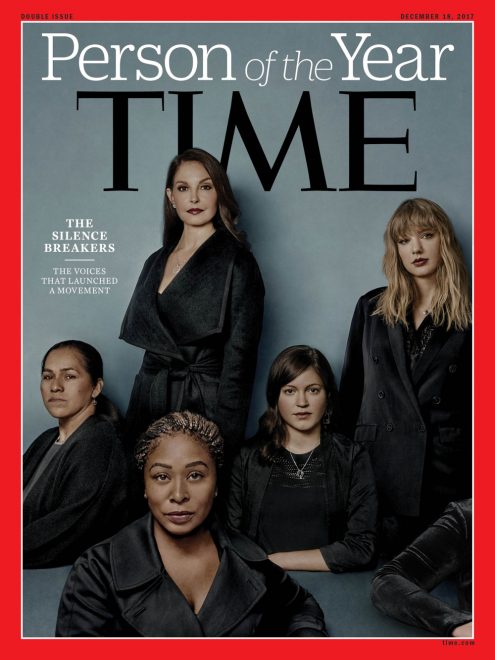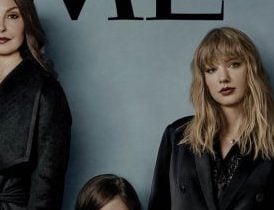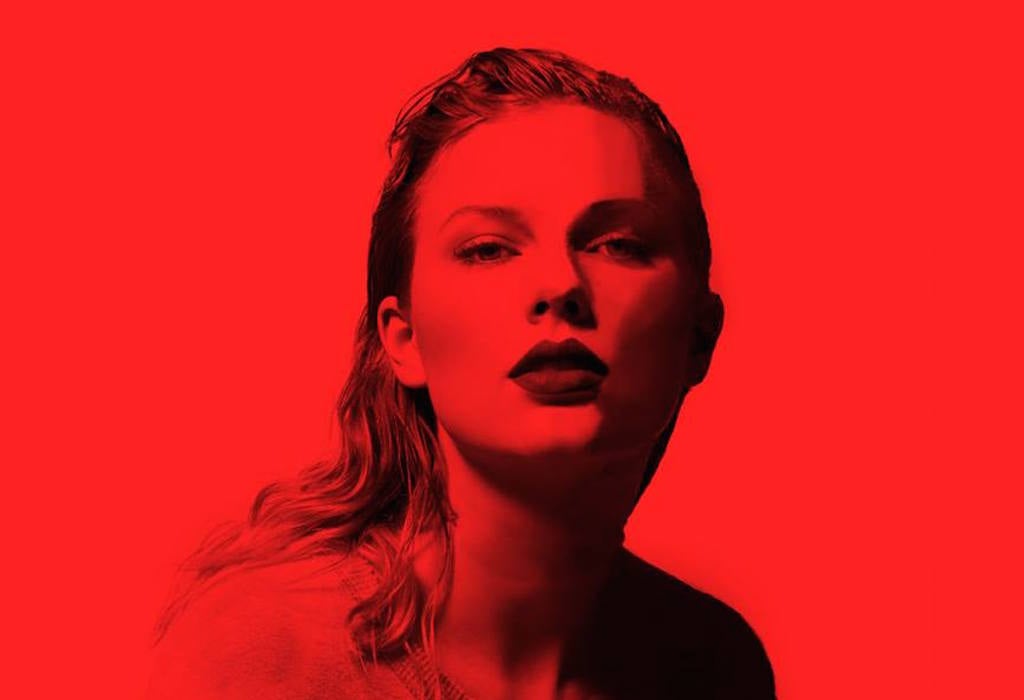A Primer On The Controversy Around Time Mag And “Silence Breaker” Taylor Swift
Heads up: there's a hell of a lot to get through here.

In an extremely 2017 turn of events, Time’s Person of the Year announcement has come with a whirlwind of controversy involving Taylor Swift, sexual assault, and an outpouring of anger about someone arguably being awarded things on false merit. Heads up: there’s a hell of a lot to get through here.
As you probably saw this morning, Time‘s Person of the Year title was actually bestowed on a large group of people this year: the “silence breakers”. The group consists of the many people who have spoken out about sexual harassment and assault, led the #MeToo movement, and helped topple predators who have wielded institutional power for far too long.
This group includes Tarana Burke, the activist behind “me too”; Alyssa Milano, the actor who skyrocketed it into public consciousness; Ashley Judd and Rose McGowan, some of the first women to speak out against Harvey Weinstein; Uber engineer Susan Fowler, who went public about sexual harassment in tech; Terry Crews, who’s filing suit against his alleged abuser; a hospitality worker from Texas who has remained anonymous, representing the many people who are not able to speak publicly; and Taylor Swift, who faced off against a DJ in court over claims of sexual assault.
Amazing.
Here’s the kicker:



Yeah. Let’s get into it.
The Argument For Taylor On The Cover
If you missed the news entirely: Taylor Swift won a countersuit against DJ David Mueller earlier this year, for claims he had “grabbed [her] ass underneath [her] skirt”. Mueller had initially brought legal action against Swift, as he claimed he’d lost his job because of false claims of sexual assault. A judge found there wasn’t sufficient evidence to prove Swift had anything to do with Mueller’s termination, then the singer turned it back on him.
Swift brought action against Mueller for the alleged incident itself and, after a few tough days in court, a jury ruled in her favour. Mueller was asked to pay one symbolic dollar as damages (which, not for nothing, he’s not yet paid).
Swift said she pursued the countersuit to act as “an example to other women who may resist publicly reliving similar outrageous and humiliating acts”. In court, her lawyer argued “by returning a verdict on Ms. Swift’s counterclaim for a single symbolic dollar, the value of which is immeasurable to all women in this situation… You will tell every woman that no means no.”
This had flow-on effects. Swift made headlines for her frank demeanour in court; she was widely praised for shutting down condescending lawyers and repeated attempts at victim blaming. “I am not going to allow your client to make me feel like it is anyway my fault because it isn’t,” she said, while being questioned. Thinkpieces called her an everywoman and lauded her testimony as part of “a generational war [that had been] won”.
Swift donated an undisclosed amount to organisations which help survivors of sexual assault. “I acknowledge the privilege that I benefit from in life, in society and in my ability to shoulder the enormous cost of defending myself in a trial like this,” she said at the time. “My hope is to help those whose voices should also be heard.”
Good morning Taylor Swift who went through emotional hell to ensure women understand they can speak up and they are never alone
— Don't Blame Leigh (@fearlessleigh) August 15, 2017
Time has now published Swift’s first interview about the whole experience, and she’s spoken more generally about the problems facing survivors of harassment and assault. “There is a great deal of blame placed on the victims in cases of sexual harassment and assault,” she said. “You could be blamed for the fact that it happened, for reporting it and blamed for how you reacted. You might be made to feel like you’re overreacting, because society has made this stuff seem so casual. My advice is that you not blame yourself and do not accept the blame others will try to place on you.
“You should not be blamed for waiting 15 minutes or 15 days or 15 years to report sexual assault or harassment, or for the outcome of what happens to a person after he or she makes the choice to sexually harass or assault you.”
Taylor Swift’s case wasn’t a watershed moment in the same way as The New York Times report on Harvey Weinstein. It didn’t publicly prompt follow-on accusations, or spur a viral hashtag. But effects from these things aren’t always visible and when one of the world’s biggest pop stars talks like this, it matters.
taylor swift is a victim of sexual assault. she came forward, she went to court when the man who groped her tried to victim-blame her, & stood up for millions of victims of sexual assault. you don't get to invalidate her experiences just because you don't like her or her music. pic.twitter.com/0DDBrXC660
— britta (@mogirlprobs) December 6, 2017
For those criticizing @Time for putting @taylorswift13 on its #POY cover, let's remember she sued that jerk (for $1) and refused blame for him losing his job over his bad behavior. She helped set a new standard against intimidation and won for us all.
— Christina Binkley (@BinkleyOnStyle) December 6, 2017
The Argument Against
The argument that Swift’s words matter is also, weirdly, one of the main points being used against her. Swift’s words do matter, and again and again, she’s made decisions not to use them.
As Junkee’s Katie Cunningham wrote earlier this year, Taylor “Silence Breaker” Swift is one of the most notoriously silent privileged women in the world right now. “When leaked audio caught Donald Trump advising men to grab women ‘by the pussy’, she stayed silent. When Trump was elected, she stayed silent. Still, today, she is silent. If Kim K exposed Taylor’s victimhood narrative as a fraud, the election of Donald Trump revealed her feminism to be nothing but smoke and mirrors.”
Even if you think celebrities don’t have an obligation to comment on politics, it’s harder to argue with Swift. She built her brand on girl power and squad goals and female strength, but as that squad took to the streets to defend their rights and condemn white supremacy she was nowhere to be found. In fact, there are various reports about her actively trying to silence people when they asked her to do more.
All that doesn’t make her work at the Mueller trial any less valid. Swift stood strong for her rights and made her position clear. But what of the women who make it their daily business to stand for the rights of others? After decades of personal and professional hardship and months of fighting it out on Twitter, Rose McGowan didn’t make the cover. Neither did Tarana Burke and she literally came up with #MeToo.
Is it really Taylor Swift’s voice that helped “launch a movement”?
I really wish Terry Crews, Garbielle Union, Lupita, Kesha or Tarana had been featured on the cover over T**lor S**ft. What I am saying doesn't minimize what happened to her, but she somehow always manages to get centered within discussions she is never vocal about.
— Lara Witt (@Femmefeministe) December 6, 2017
Imagine if TIME had included the people who came forward about R Kelly
— Fa-la-la-la-lanna (@AlannaBennett) December 6, 2017
Of course these decisions don’t happen in a vacuum, and Time isn’t exactly giving out Nobel Prizes. Previous people of the year have included Donald Trump and Hitler and, at the end of the day, the title is just a talking point. Writing about this for The Outline, Ann-Derrick Gaillot labelled the decision to foreground Swift an “economically strategic one”. But does that do more harm than good?
“As one of the most successful pop artists in the world and one of Instagram and Twitter’s most-followed users, the difference between putting Swift on the cover and in the article or not was potentially a difference of millions of dollars. In valuing money over truth, the singer and magazine have something in common.”
AGHHHH!!!!!
There is a lot happening here, and each facet is being seen in many different ways:
Swift being chosen for the cover to sell magazines is bad because it puts economic imperative over moral worth… Swift being chosen for the cover to sell magazines is good because she’s a high-profile addition to a chorus of strong women, and the more people who read this stuff the better.
Swift’s place should have been given to someone who has fought harder; someone who’s had to put more on the line or been unfairly marginalised in this fight…
Stop it. Just. Stop. Nobody is saying Taylor Swift wasn't victimized. Nobody is saying Taylor Swift doesn't deserve to speak about her experience. People are just wondering why she was picked to be the face of a movement over the woman who ACTUALLY CREATED THE MOVEMENT.
— ?️?Jenny "IDK, something Christmas" Trout (@Jenny_Trout) December 6, 2017
OR Swift’s place and the worth of her fight shouldn’t be up for debate at all; there’s no meritocracy in speaking up against sexual violence and harassment, and to say there is is to undermine the strength of the movement as a whole.
twitter feminism is taking taylor swift out of an entire group of people that have been sexually harassed and playing the oppression olympics by saying that her case somewhat deserved less attention because it happened to a woman you don‘t like https://t.co/I97ozMtHlh
— anna (@anyataylorsjoy) December 6, 2017
I’m not going to tell you exactly how to feel about this. I understand if you’re saddened, or frustrated, or tired or just detached from the whole thing (though if you’ve gotten so far into this piece, you’re probably more invested than you think).
There are fights on so many sides these days, it’s fine if you don’t have the energy for one more about a magazine cover. It’s a hell of a magazine cover though. And the fact that there are too many women to choose from — too many women who have been gagged and actively pushed away from the spotlight in every other year of Time‘s existence — is at least one thing worth reflecting on.
If we want this to be a movement for the history books, at some point we should consider what exactly the pages are going to say.
Meg Watson is the Editor of Junkee. She tweets @msmegwatson.
